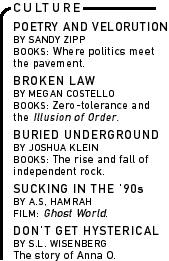|
|

|

|

|
|
|
| |
||
|
War Crimes The August 6 editorial, "Milosevic's Reckoning" by Joe Knowles, confirms once again the fact that In These Times is a liberal, not a left, journal, and that it supports a liberal and "responsible" imperialism. A crucial feature of this kind of liberalism is its exemption of the United States and its principal allies from fundamental criticism and condemnation for criminal behavior, and its acceptance of the imperial powers as the proper regulators of global law and order. Of course it can be acknowledged that in the distant past the United States may have done some really bad things--Knowles tells us that we have a "stained history"--so that, following Christopher Hitchens, he boldly assails Pinochet and Kissinger and Operation Condor, and implies that maybe these involve cases of war criminality. He nowhere discusses why it is that they are exempt from tribunal treatment, or just why it is that "despots and war criminals everywhere" are exempt, unless the United States chooses to go after them. Liberal imperialism is happy that the targets selected by the imperial power are brought to book. And when he gets to present-day affairs Knowles never suggests that the United States has done anything recently that might make it liable for war crimes. He talks about double-standards and the alleged hypocrisy in the U.S. opposition to an International Criminal Court, which would be "a palpable threat to despots and war criminals everywhere." But nowhere in his article does he hint that the "palpable threat" might apply to the United States itself for crimes today. He never mentions Iraq, where the "sanctions of mass destruction" have killed perhaps 500,000 children, or the Clinton support of "our kind of guy" Suharto and tacit acceptance of Indonesia's 1999 destruction of East Timor. And you can be sure that Knowles doesn't go into the question of whether NATO's use of fragmentation bombs and depleted uranium, its escalated bombing of civilian facilities in Serbia that killed as many as 1,800 Serb civilians in clear violation of the Sixth Principle of Nuremberg, or its violation of the U.N. Charter in attacking Yugoslavia constituted war crimes. Knowles also displays his liberal credentials by taking issue with the way in which Milosevic was "purchased" for delivery to the tribunal and the dishonest maneuvering implementing his transfer. But not surprisingly it turns out that Knowles approves of the transfer despite these unpleasantries and its damaging effects on the fragile Yugoslavian democracy. He also has not a critical word to say about the workings of the tribunal, which has regularly violated every known standard of Western jurisprudence. A liberal imperialist can overlook this. After all, the tribunal action, by pointing up the demon's evil and responsibility for all the Balkan troubles, vindicates NATO's war and In These Times' pretty consistent support of that war via Paul Hockenos, Bogdan Denitch and Knowles. Better not look too closely at the workings of "our" court, or real history, as it might turn out that the "stained history" extends up to today. Edward S. Herman
"Evasive" is the charitable way to describe Bogdan Denitch's defense of NATO's intervention against the Milosevic regime ("Letters," August 6). Granting that outside intervention was warranted, what form should it have taken? As argued at the time, repeatedly and from several quarters, the quickest and most efficient way to stop the killing would have been introduction of multinational ground forces directly into the affected areas. But for the United States, this would have violated the basic rule of "kicking the Vietnam syndrome" interventions: no American casualties. And it would have been totally at odds with U.S. goals in 1999--reasserting our "indispensable nation" status, expanding NATO eastward as a manifestation of continued U.S. "presence" in European affairs, and marginalizing the United Nations as an effective arbiter of international and regional conflicts. So instead we carried out a horrendous "air campaign" and committed clear, indictable war crimes of our own. But from Denitch, nary a hint that U.S. bombs fell, how many, when, or on whom. Apparently his democratic socialist values are expendable whenever a higher law calls--in this instance, that interveners need not be "as pure as newly fallen snow." Richard B. Du Boff
Two traits stand out in Bogdan Denitch's response to Edward S. Herman. The first is Denitch's abusively sarcastic, often ad hominem tone. The second is the almost total lack of supporting evidence that Denitch presents for his claims. Thus, many critical points that Herman raised, Denitch simply passes over in silence. For example, no one––not the OSCE, NATO, State Department or The Hague Tribunal––has ever produced any evidence that supports Denitch's contention that "massive killings and expulsions were taking place before the NATO intervention." Denitch also recites a list of atrocities attributable to Serbs: Vukovar, Dubrovnik, Sarajevo and Srebrenica. But these incidents derived from fighting in Croatia (1991) and Bosnia-Herzegovina (1992-1995), respectively, all in the context of brutal civil wars, and clearly had nothing to do with the question of war or peace in Kosovo in 1998-1999. And yet Denitch seems to believe that these earlier, unrelated cases alone provide sufficient grounds to justify NATO's war against Yugoslavia. Finally, Denitch closes his letter with what he clearly takes to be the most important issue: "Who can intervene with what force against murderous regimes"? For anyone to be able to pose this question in a magazine with leftist aspirations, published in a country with a track record like the United States has, without realizing that "murderous regimes," and therefore justifiable wars, would work both ways, represents a spectacular case of blindness. When was the last time Denitch supported the bombing of Washington? Or the naval blockading of Puget Sound? Denitch's take on NATO's war over Kosovo represents nothing more than humanitarian hypocrisy. James Fumbanks
Some Balance, Please As a progressive who supports Israel, I was dismayed by your cover story "If They Knew, They Would Have to Do Something" (August 6). Why might we never see an article on your pages about the Arab suicide bombers, who are regularly murdering innocent Israelis, such as teen-agers from the former Soviet Union? Are indiscriminate murderers to be deemed freedom fighters? Consider that the world's treatment of the Jewish people has been a rightful litmus test for society for centuries, much as has been the treatment of black Americans in our own country. Moreover, had the Palestinian Arabs been mildly reasonable, and the daring plan of the Barak government agreed to, there would have been a Palestinian state in the making by now. No Arabs would be killed now by Israelis if the suicide bombers and other terrorists were reined in. After these many years, it is long past time for some even-handedness from In These Times on Arab-Israeli issues. Stephen E. Appell
As the World Warms I understand that "global warming" is becoming an important means of mobilizing people to oppose the agenda of certain multinational corporations ("Common Cause," August 6). And I understand that scientists have documented a definite warming of the planet, which may be due to changes caused by humans in the past century. But in all the mobilizing discussions on global warming, some important information is missing. A thousand years ago, it was warm enough on this planet that the people of Northern Europe did not need central heating. Then a "mini ice age" arrived, and Europeans had to invent the chimney to survive. While the planet is warming today, it is still not as warm as it was back then. It certainly isn't as warm as it was when dinosaurs ruled the earth. So even if humans did not evolve as a species and start burning petroleum like crazy, the planet might still be warming up today. I think it would be better for organizers to be a little more honest about what they are doing, which is mobilizing against some multinational corporations. As for global warming, I think it is a pretty safe bet that the planet will get warmer, and coastal flooding and severe storms and drought and all the rest will happen, creating all sorts of opportunities to organize people to ameliorate these catastrophes. But cutting the consumption of petroleum may not have much of an effect in preventing additional warming. If there are other good reasons to reduce petroleum consumption, by all means let's bring them to the attention of the public. But don't cry "global warming" out of the context of global temperature changes of the last few millennia. Chris Vail
Warts of Suburbia Bill Boisvert has some nice things to say about my book, America's Undeclared War: What's Killing Our Cities and How We Can Stop It, and some not-so-nice things as well ("It's Up to You, New York," July 9). One point he makes merits a detailed reply, i.e., the supposed relationship between suburbanization and something he calls "the General Will." In Boisvert's view, the latter has sent Americans galloping in the direction of the former. As he puts it: "If anything can be said to express the General Will, it's suburbia. ... America has not had suburbs foisted upon it against its will. America likes suburbs, warts and all." This is a common point of view, but one that is almost painfully solipsistic. If all Boisvert is saying is that Americans have long had a hankering for trees, grass and elbowroom, then so have other people as well. But a love of greenery can express itself in many ways--in urban parks, for instance, in hiking and cycling clubs, or in weekend cottages. The question in America is why it has taken the form of vast, auto-dependent suburbs that are no less wasteful of human resources than they are of natural ones. I would submit that an amorphous concept like the General Will is of absolutely no use in answering this question. Indeed, in Boisvert's hands, it becomes nothing more than a general apology for the status quo. If Americans drive SUVs, in other words, then Americans must like SUVs, so what can you do? Yet Americans also like traffic-free highways, walkable communities and limits to suburban sprawl. They can't have it all. The problem is how to resolve such conflicting longings in a way that propels society forward rather than tying it up even more thoroughly in knots. The question of how the American people fell into such a trap and how they can find their way out is one that can only be answered politically, something my book tries to do. Daniel Lazare
Clarification The editors wish to make clear that the subtitle to "The Brame Game" (September 3) was not intended to suggest that any union has taken a position on the nomination of J. Robert Brame to the National Labor Relations Board based on his religious beliefs. Rather, the headline referred to Brame's deep-seated opposition to unions indicated by his own writings and ties to extremist religious groups. We regret any confusion.
Publisher's Note I'm sorry to inform you that I have resigned my position as publisher of In These Times. Circumstances in the technology/business side of my life have necessitated my becoming the president of Xamplify (www.xamplify.com), a software startup here in Berkeley. Regrettably, this will take so much of my time that I will not be able to continue as In These Times' publisher. I've enjoyed my all-too-brief stint in this position. I've come away with a new appreciation for the folks whose resourcefulness and tenacity result in the biweekly publication of this magazine. I know that you will join me in continuing to support this valiant effort. Bob Burnett
|





